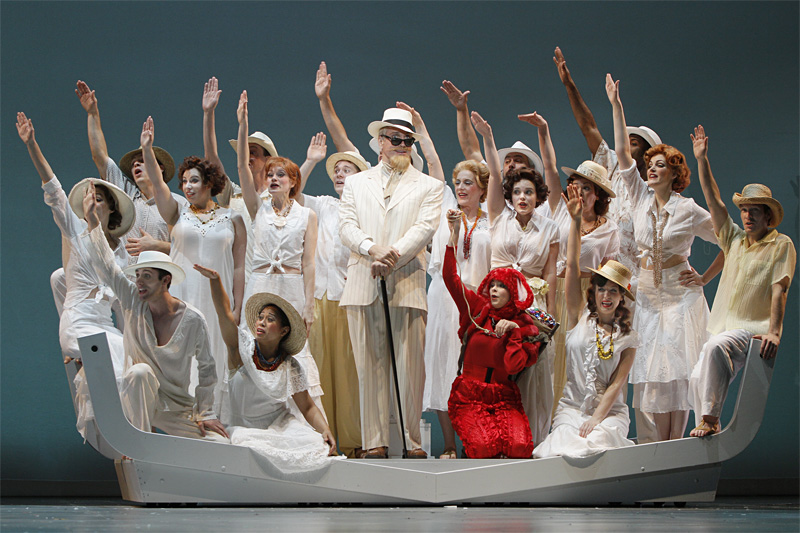Though the 10-year-old girl in the row ahead of me seemed to get through it OK, let it be known that this production of Candide—with its 257 onstage deaths, endless lighthearted banter about rape and whoring, two floggings, and used-condom sight gag—is not exactly a show for kids. David Armstrong’s staging is a visually stylish and uncluttered take on a problematic musical, with the cast dressed (by Lynda L. Salsbury) and coiffed in sharp mid-century fashion, as if the cast from the 5th Avenue’s last production, On the Town, decided to stick around and do another Leonard Bernstein show.
As the Narrator/Dr. Pangloss, David Pichette is almost never offstage; performing with nimble aplomb, he makes his exacting responsibilities look easy. Anne Allgood, eschewing mugging, brings the show a dry comic snap as the Old Woman. And any actress who can both be funny and knock out “Glitter and Be Gay”—the showiest of all possible arias—as Laura Griffith does, is a gift from above. I suddenly understood why the production went for the ’50s look: so Griffith would look fabulous in this scene, like a brunette Grace Kelly in a vintage Dior ad. Stanley Bahorek couldn’t quite overcome the title role’s Harry Potter Syndrome: An upright everyman hero surrounded by colorful characters risks coming off beige in comparison. The 14-member pit band, under Joel Fram, sparkled, though the miking made them sound a bit tinny.
This production uses John Caird’s 1999 rewrite of Candide‘s book, which has been tinkered with again and again since the musical’s 1956 premiere. As for this being the definitive version, as Armstrong suggests—uh-uh. Caird went back to Voltaire’s source novel and traced it almost chapter by chapter; the result is something like a staged reading of the novel with the songs inserted at regular intervals like cloves in a ham. Caird, a theater director himself (in London), couldn’t resist giving the actors flamboyant, wordy expository monologues, recounting with relish as many of the novel’s grim incidents as could be packed in. And the 5th Avenue’s cast does indeed make these tales as entertaining as possible, though I generally found myself a bit impatient to get to the next song.
But what can you do? The inevitable flaw in any version of Candide is inherent in Voltaire’s novel—in fact, it’s Voltaire’s point: the randomness of real life, as opposed to the callous rationalization of every atrocity as God’s will. And so Voltaire makes a lot of random adventures befall his hero—no point, no divine plan—and the musical has to do the same. Making a workable theater piece based on the concept of arbitrariness: That’s the challenge of Candide. It’s an irresistible challenge, because the music is irresistible. Maybe the only way to deal with it is to focus on Bernstein’s score—to let it provide the purposefulness and sense of direction the story deliberately lacks, and to perform these beautiful, pearl-like songs strung together with as little talk as possible.







